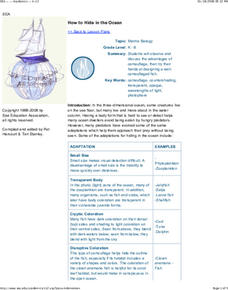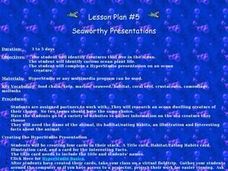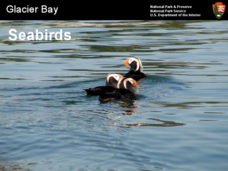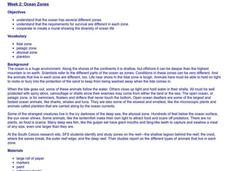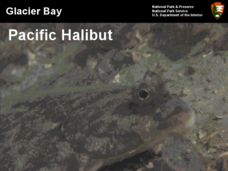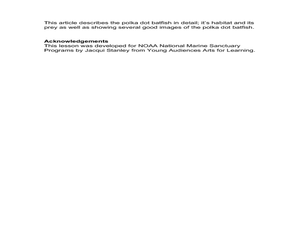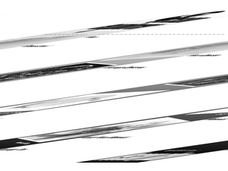Curated OER
How to Hide in the Ocean
Students observe and discuss the advantages of camouflage, then try their hands at designing a well-camouflaged fish.
American Museum of Natural History
Crazy Camouflage
Scholars discover the crazy camouflage technique of the flounder fish. After reading three informative paragraphs, participants follow steps to make a model of the sea creature.
Curated OER
How to Hide in the Ocean
Students observe the advantages of camouflage. They design a well camouflaged fish of their own.
Curated OER
Bioluminescence 2009: Living Light on the Deep Sea Floor Expedition - Now You See Me, Now You Don't
Students examine bioluminescence and camouflage of deep sea creatures. For this deep sea creatures lesson, students investigate the visible and near-visible light spectrum. They work in small groups to complete a light, color, and...
Curated OER
Seaworthy Presentations
First graders research ocean animals and plants on the web. In this ocean habitat lesson plan, 1st graders prepare a multimedia presentation. Students will work on their presentations in pairs and every group should have its own...
Curated OER
Wildlife
First, biology pupils research land and marine habitats along the route of skipper Rich Wilson's Great American II. Then, using colored paper clips scattered across a colored paper background, they play the predator-prey game to...
Curated OER
Glacier Bay Seabirds
A gorgeous collection of photographs take viewers on a virtual tour or Glacier Bay National Park with a focus on the seabirds living in the area. Adaptations to the polar climate are highlighted, different species of birds are displayed,...
Curated OER
Camouflage, Protection, & Adaptations—Who am I?
Students explore ocean animal adaptations. In this animal adaptations lesson, students examine how different ocean animals use adaptations other than camouflage to protect themselves.
American Museum of Natural History
What's This? Staying Safe
Amaze the class with the creative adaptations species employ to trick predators. An online interactive lesson introduces learners to six different species with unique adaptations. Each species highlights a different adaptation and its...
Curated OER
Ocean Zones
Students create a mural showing ocean zones and the diversity of ocean life. They use reference books to create a list of plants and animals that would live in each zone.
Curated OER
Blending Butterflies
Students create camouflage butterflies. In this camouflage lesson plan, students read about the different types of camouflage. Each student in the class chooses a spot in the classroom and creates a camouflaged butterfly. They hang up...
American Museum of Natural History
What's This? Colorful Creatures
An online resource shows learners some species that are very good at using their camouflage as well as other ways species use their coloring for survival. Interactive and digital, the lesson is perfect as a remote learning resource.
American Museum of Natural History
Journey to Deep Sea Vents
Take a deep dive into oceanography. The online interactive allows for learners to board a submersible to dive to the bottom of the ocean to investigate sea vents. On the way down, individuals see different marine life at different...
Curated OER
Glacier Bay Pacific Halibut
The National Park Service has produced a high-quality presentation on the halibut population of Glacier Bay, Alaska. It takes the viewpoint of the marine biologists or rather, ichthyologists, who have been studying the adaptations,...
Curated OER
Drawing Fish
Learners practice creating art by imitating the camouflage of fish. In this animal characteristic lesson, students identify certain fish and their ability to change colors in order to survive in the wild. Learners utilize coloring...
Curated OER
Ocean World - Interactive On-line Quiz - Coral Reefs
For this coral worksheet, students answer 9 multiple choice questions about coral and coral reefs using an interactive on-line format.
Curated OER
To See or Not to See
Students identify and discuss key factors that determine how effective color camouflage is in certain habitats. In this investigative lesson students divide into groups and study light.
American Museum of Natural History
Make Your Own Creatures of Light
Bioluminescent animals are the focus of a hands-on craft in which scholars create a scene of either a land or sea bioluminescent creature.
Curated OER
Now You See Me, Now You Don't
Bioluminescence fascinates most upper elementary scientists. Display images of different glowing deep-sea organisms and discuss their environment. Young biologists then experiment with images and different colors of filtered light. In...
Curated OER
A Bioluminescent Gallery
Students examine the different types of luminescence in deep sea organisms. In this bioluminescence lesson, students investigate how color and light aide deep ocean organisms by describing the characteristics of the habitat and...
Curated OER
Creatures That Glow In The Night
Students investigate the different bioluminescent organisms. They use microscopes in order to make observations and draw what is seen. Students demonstrate they have studies the differences between the process of photosynthesis and...
Curated OER
Crab Crossword Puzzle
In this crab worksheet, learners read ten clues that pertain to sea crabs. Students match these to vocabulary words in a box. Learners fit their answers in a crossword puzzle.
Curated OER
Light at the Bottom of the Deep, Dark Ocean?
Young scholars participate in an inquiry activity. They relate the structure of an appendage to its function. They describe how a deepwater organism to its environment without bright light.
Curated OER
Wildlife
The centerpiece of this lesson plan is a predator-prey simulation in which colored paperclips represent different species of animals camouflaged against a colored background. Relevant follow-up questions are provided. The activity is...




